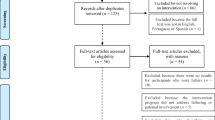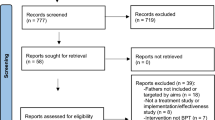Abstract
Survey (n = 161) and focus group (n = 15) methods were used to collect data from a community sample of New Zealand fathers about their knowledge and experience with parenting programs, and their preferences for program content, features, and delivery methods. The prevalence of perceived child behavioral and emotional difficulties, parenting risk and protective factors, fathers’ parenting confidence, and the family and personal correlates of father preferences were also examined. Survey results showed that fathers’ knowledge and experience of available parenting programs was low. The topics rated most highly by fathers to include in a program were building a positive parent–child relationship, increasing children’s confidence and social skills, and the importance of fathers to children’s development. Fathers’ most preferred program delivery methods were father only group programs, individually-tailored programs, and a range of low intensity options, including seminar, television series, and web-based. Program features most likely to influence father attendance were demonstrated program effectiveness, location of sessions, practitioner training, and that content addressed personally relevant issues. Fathers’ level of education, stress and depression, and perceptions of child behaviour difficulty were linked to program content and delivery preferences. New insights were gained from focus group participants about messages to include in program advertisements and program content to emphasise in order to engage fathers. Findings highlight a variety of program and delivery options that could be offered to meet a range of father parenting support needs, including concerns about coping with specific child behaviours and emotions, and managing personal and parenting stress.
Similar content being viewed by others
References
Addis, M. E., & Mahalik, J. R. (2003). Men, masculinity, and the contexts of help seeking. American Psychologist, 58, 5–14. doi:10.1037/0003-066X.58.1.5.
Anderson, E. A., Kohler, J. K., & Letiecq, L. (2002). Low-income fathers and “responsible fatherhood” programs: A qualitative investigation of participants’ experiences. Family Relations: An Interdisciplinary Journal of Applied Family Studies, 51, 148–155. doi:10.1111/j.1741-3729.2002.00148.x.
Atwood, R., Gold, M., & Taylor, R. (1989). Two types of delinquents and their institutional adjustment. Journal of Consulting and Clinical Psychology, 57, 68–75.
Bagner, D. M., & Eyberg, S. M. (2003). Father involvement in parent training: When does it matter? Journal of Clinical Child and Adolescent Psychology, 32, 599–605.
Berlyn, C., Wise, S., & Soriano, G. (2008). Engaging fathers in child and family services. Family Matters, 80, 37–42.
Bogels, S., & Phares, V. (2008). Fathers’ role in the etiology, prevention and treatment of child anxiety: A review and new model. Clinical Psychology Review, 28, 539–558. doi:10.1016/j.cpr.2007.07.011.
Cowan, P. A., & Cowan, C. P. (2002). Interventions as tests of family systems theories: Marital and family relationships in children’s development and psychopathology. Development and Psychopathology, 14, 731–759. doi:10.1017/S0954579402004054.
Cowan, P. A., Cowan, C. P., & Knox, V. (2010). Marriage and fatherhood programs. The Future of Children, 20, 205–230. doi:10.1353/foc. 2010.0000.
Dave′, S., Nazareth, I., Senior, R., & Sherr, L. (2008). A comparison of father and mother report of child behaviour on the strengths and difficulties questionnaire. Child Psychiatry and Human Development, 39, 399–413. doi:10.1007/s10578-008-0097-6.
Dretzke, J., Davenport, C., Frew, E., Barlow, J., Stewart-Brown, S., Bayliss, S., et al. (2009). The clinical effectiveness of different parenting programmes for children with conduct problems: A systematic review of randomised controlled trials. Child and Adolescent Psychiatry and Mental Health, 3, 7. doi:10.1186/1753-2000-3-7.
Eyberg, S. M., Nelson, M. M., & Boggs, S. R. (2008). Evidence-based psychosocial treatments for children and adolescents with disruptive behavior. Journal of Clinical Child and Adolescent Psychology, 37, 215–237. doi:10.1080/15374410701820117.
Fabiano, G. A. (2007). Father participation in behavioral parent training for ADHD: Review and recommendations for increasing inclusion and engagement. Journal of Family Psychology, 21, 683–693. doi:10.1037/0893-3200.21.4.683.
Frank, T., Keown, L., & Sanders, M. (2014). An RCT of Group Triple P for fathers and mothers of children with conduct problems. Manuscript submitted for publication.
Goodman, S. H., & Gotlib, I. H. (1999). Risk for psychopathology in the children of depressed mothers: A developmental model for understanding mechanisms of transmission. Psychological Review, 106, 458–490. doi:10.1037/0033-295X.106.3.458.
Hoff, E., Laursen, B., & Tardif, T. (2002). Socioeconomic status and parenting. In M. H. Bornstein (Ed.), Handbook of parenting. Biology and ecology of parenting (Vol. 2, pp. 231–252). Mahwah, NJ: Erlbaum.
Kirby, J. N., & Sanders, M. R. (2012). Using consumer input to tailor evidence-based parenting interventions to the needs of grandparents. Journal of Child and Family Studies, 21, 626–636. doi:10.1007/s10826-011-9514-8.
Knoster, C. (2003). Implications of childhood externalizing problems for young adults. Journal of Marriage and Family, 65(4), 1073–1080.
Lazar, A., Sagi, A., & Fraser, M. W. (1991). Involving fathers in social services. Children and Youth Services Review, 13, 287–300. doi:10.1016/0190-7409(91)90065-P.
Lee, C. M., & Hunsley, J. (2006). Addressing coparenting in the delivery of psychological services to children. Cognitive and Behavioral Practice, 13, 53–61. doi:10.1016/j.cbpra.2005.05.001.
McLanahan, S., & Teitler, J. (1999). The consequences of father absence. In M. E. Lamb (Ed.), Parenting and child development in “non-traditional” families (pp. 83–102). Mahwah: Lawrence Erlbaum Associate Publishers.
Metzler, C. W., Sanders, M. R., Rusby, J. C., & Crowley, R. N. (2012). Using consumer preference information to increase the reach and impact of media-based parenting interventions in a public health approach to parenting support. Behavior Therapy, 43, 257–270. doi:10.1016/j.beth.2011.05.004.
Morawska, A., Sanders, M., Goadby, E., Headley, C., Hodge, L., McAuliffe, C., et al. (2011). Is the Triple-P Positive Parenting Program acceptable to parents from culturally diverse backgrounds? Journal of Child and Family Studies, 20, 614–622. doi:10.1007/s10826-010-9436-x.
O’Brien, C., & Rich, K. (2003). Evaluation of the Men and Family Relationships Initiative: Final report and supplementary report. Balmain, New South Wales: Department of Family and Community Services.
Sanders, M. R. (2012). Development, evaluation and multinational dissemination of the Triple P-Positve Parenting Program. Annual Review of Clinical Psychology, 8, 345–379. doi:10.1146/annurev-clinpsy-032511-143104.
Sanders, M. R., Dittman, C. K., Keown, L. J., Farruggia, S., & Rose, D. (2010). What are the parenting experiences of fathers? The use of household survey data to inform decisions about the delivery of evidence-based parenting interventions to fathers. Child Psychiatry and Human Development, 41, 562–581. doi:10.1007/s10578-010-0188-z.
Sanders, M. R., Haslam, D. M., Calam, R., Southwell, C., & Stallman, H. M. (2011a). Designing effective interventions for working parents: A web-based survey of parents in the UK workforce. Journal of Children’s Services, 6, 186–200. doi:10.1108/17466661111176042.
Sanders, M. R., & Kirby, J. N. (2011). Consumer engagement and the development, evaluation, and dissemination of evidence-based parenting programs. Behavior Therapy, 43, 236–250. doi:10.1016/j.beth.2011.01.005.
Sanders, M., Kirby, J., Tellegen, C., & Day, J. (2013). Towards a Public Health approach to parenting support: A systematic review and meta-analysis of the Triple P-Positive Parenting Program. Submitted for Publication.
Sanders, M. R., Stallman, H. M., & McHale, M. (2011b). Workplace Triple P: A controlled evaluation of a parenting intervention for working parents. Journal of Family Psychology, 25, 581–590. doi:10.1037/a0024148.
Santucci, L. C., McHugh, K. R., & Barlow, D. H. (2011). Direct to consumer marketing of evidence-based psychological interventions. Behavior Therapy, 43, 231–235. doi:10.1016/j.beth.2011.07.003.
Statistics New Zealand. (2010). New Zealand income survey: June 2010 quarter. Wellington, New Zealand: Statistics New Zealand.
Thomas, D. R. (2006). A general inductive approach for analyzing qualitative evaluation data. American Journal of Evaluation, 27, 237–246. doi:10.1177/1098214005283748.
Tiano, J. D., & McNeil, C. B. (2005). The inclusion of fathers in behavioral parent training: A critical evaluation. Child & Family Behavior Therapy, 27, 1–28. doi:10.1300/J019v27n04_01.
Webster-Stratton, C., & Hammond, M. (1997). Treating children with early-onset conduct problems: A comparison of child and parent training interventions. Journal of Consulting and Clinical Psychology, 65, 93–109.
Wilson, S., & Durbin, E. C. (2010). Effects of paternal depression on fathers’ parenting behaviors: A meta-analytic review. Clinical Psychology Review, 30, 167–180. doi:10.1016/j.cpr.2009.10.007.
Author information
Authors and Affiliations
Corresponding author
Rights and permissions
About this article
Cite this article
Frank, T.J., Keown, L.J., Dittman, C.K. et al. Using Father Preference Data to Increase Father Engagement in Evidence-Based Parenting Programs. J Child Fam Stud 24, 937–947 (2015). https://doi.org/10.1007/s10826-014-9904-9
Published:
Issue Date:
DOI: https://doi.org/10.1007/s10826-014-9904-9




